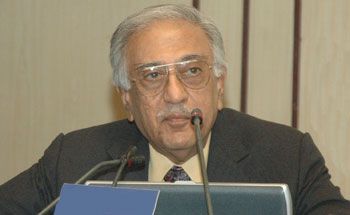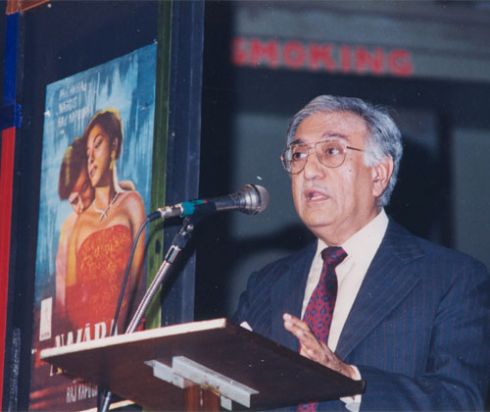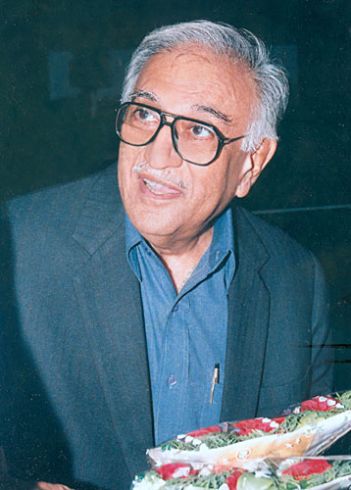


Behno aur Bhaiyo...main apka dost Ameen Sayani bol raha hoon...aur aap sun rahe hain Binaca Geet Mala", these mesmerising lines still have a recall value across generations. The man behind the golden voice, Ameen Sayani chats with Radioandmusic.com's Anita Iyer tracing sixty years of evolution of radio, penetration of private players in the radio space and changes in the radio fraternity over the decades.
You have been a part of the radio industry since the heydays of All India Radio. Which do you feel were the milestones in the Indian radio sector over the years?
The then I&B minister B V Keskar had slightly offbeat ideas about what should be allowed on air and what should not be. He took some disastrous steps, the most important being the ban of film music on AIR, which, at that time had a rich library of film music. It was a golden period of Indian cinema with the best singers, composers and lyricists being a part of the industry. Radio was the greatest home entertainment medium. At the same time, Radio Ceylon started and the listenership shifted from AIR to Ceylon.
Radio Ceylon didn't have proper announcers in place but it clicked with the audiences only because they played Hindi film music. By 1950, Radio Ceylon had set up a regular unit of broadcasters for commercial work in Bombay. My brother Hameed was the Programme director of Ceylon and he brought in good sponsored programmes and commercials. By 1951-52, Ceylon had a host of sponsored shows like Lipton Ke Sitaare, Binaca Getmala, Ponds Hit Parade, Polsons quiz kids, S Kumars ka filmi mukadama etc. With the commercials came feature film publicity, which gave colour and variety to Radio Ceylon broadcasting.
Was there any other reason for the decline in AIR's listenership?
In 1947, after Independence, a large number of broadcasters, news readers, announcers went to Pakistan, the most notable among them the Bokhari brothers. Under the I&B regulations, announcers were not supposed to chat but present everything in a morose fashion, reading from a script. So, AIR became terribly boring and listeners preferred Radio Ceylon.
What then led to Ceylon's declining popularity in the 1980s?
What hit Radio Ceylon was the reception on the short waves that started dwindling in the 1970s, because the transmitters had become very old. Also, the short wave bands became very congested and by the 1980s, listeners could not hear the station well. By the late 80s, the reception almost vanished.
So, your show Geetmala was shifted to Vividh Bharati…
Geet mala, the commercial programme started on Radio Ceylon in December 1952, shifted to Vividh Bharati in 1989. Initially, it used to be Binaca Geetmala which later became Cibaca geetmala. It was further taken over by Colgate and so my show was called Colgate Cibaca Geetmala on Vividh Bharati!
Why couldn't Vividh Bharati keep its numero uno position?
In 1979, when Vasant Sathe was made the I&B minister, he revamped the commercial rate card for Doordarshan. By the 1980s, when sponsored shows started on Doordarshan, Sathe thought of raising the rates of Vividh Bharati by five times. On increasing the commercial rate, the business immediately crashed by 25 per cent and there was absolute chaos.
Did the drop in the listenership of Vividh Bharati pave the way for the rise of the private players later?
Incidentally, just after Vividh Bharati started dropping, independent FM was given time slots on Vividh Bharati transmitters to go on air. Some of the pioneers were Radio Midday and Times FM, which picked up listenership and earned money within the permitted time slots. But these were discontinued soon. The initial two sessions of bidding for privatisation of FM radio were scrapped and it was only the third bidding that worked in favour of the private players. There has been no stopping them since.
You have worked with private FM as well as AIR? How has the listenership changed over the years?
My show �Sangeet ke sitaro ki mehfil' with one hour episodes went on air on Red FM for about two and half years, completing 204 episodes. They used to air fresh episodes on Mondays and Tuesdays, with the repeat telecast on other weekdays. So, I was on air every night on Red FM when it launched.
Overall, listenership doesn't change much except for the fact that each generation has its own likes and dislikes. My show on Red FM is still broadcast in Dubai, New York, Atlanta and New Zealand.
What are your views on the contemporary FM stations?
I think they all have the same style of speaking, the same songs being played over and over with the same formats. But there are many energetic youngsters with loads of aspirations; who have the capability to become great stars in broadcasting. The FM channels need to have more variety, change the voices, formats, and develop an individual character of each station so the listeners can be segregated.
What has been the USP of your shows?
I guess it was the pre-planning of episodes and the way various components were linked that worked in my favour. Everything right from the signature tune of the show, to my entry, to the commercials, sharing personal experiences was beautifully linked and one could never switch off the radio. We also had all sorts of stunts, halla gula like the current RJs but made the listeners curious about the show to keep their ears glued to the radio.
Where yours shows scripted or were they impromptu?
I was trained right from childhood to read from a script without seeming to be doing so. That reading had a lot of advantages; you could plan your script in advance without wasting time and build in any sort of link. Each producer had his own script writers. I used to script half of my programmes myself, until I started producing shows for both Vividh Bharati and Ceylon. Then, I had 30 programmes a week, so I had a whole team of outstanding script writers who used to write scripts for me.
What is a major difference between RJing in your times and today?
Today the RJs are totally ruled by computers and do not have complete freedom on their show. Their time is limited and within that time slot, commercials, talk and music have to be pushed in. On failing to follow the time constraint, the computer cuts the RJ talk off, so it's more or less automated. Even the songs played are shortlisted by someone and the RJ has no say in it.
In Geetmala, I remember doing an episode when Neil Armstrong had stepped on the moon, so I had an episode with all the songs linked to the moon. So, you could do almost anything you wanted. But the positive change is the announcers today are chatting more than we used to in our times.
Will permitting news on private FM stations wean the listenership away from AIR?
We have many newspapers with different points of view, yet they all work. So, even AIR can co-exist with private players with permission to air news. There can be regulations to see that nobody misuses the medium by airing biased views for personal agenda.
Finally… how do you react when you hear your patent style �Beheno aur bhaiyo…' and your voice being imitated repeatedly?
It's hilarious, because I don't talk in that manner any more. Whenever I hear people imitating my voice, I just hold my head and can't help laughing!